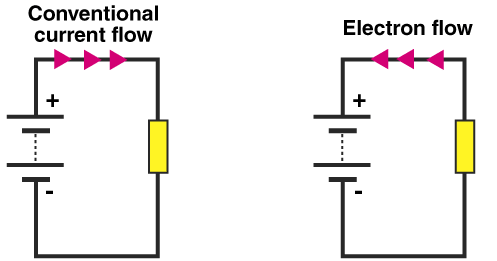IB MYP 4-5 Physics- Current in a simple circuit- Study Notes - New Syllabus
IB MYP 4-5 Physics-Current in a simple circuit- Study Notes
Key Concepts
- Current in a simple circuit
Current in a Simple Circuit
Current in a Simple Circuit
An electric circuit is a closed loop that allows charges (usually electrons) to flow. The rate of flow of electric charge is called electric current.

- Electric current (\( I \)) is defined as the rate of flow of charge.
- It flows from the positive terminal of the power source to the negative terminal (conventional current direction).
- In metals, the actual moving charges are electrons, which flow in the opposite direction to conventional current.
Formula for current:
\( I = \dfrac{Q}{t} \)
where:
- \( I \) = current (A, amperes)
- \( Q \) = charge (C, coulombs)
- \( t \) = time (s)
Key Points in a Simple Circuit

- A circuit must be closed (complete path) for current to flow.
- A power source (e.g., cell, battery) provides the potential difference that drives charges.
- Resistors, lamps, or other components use electrical energy.
- An ammeter is connected in series to measure current.
- In a series circuit, current is the same at all points.
Example:
A total charge of \( 12 \, C \) passes through a wire in \( 4 \, s \). What is the current in the wire?
▶️ Answer/Explanation
Using \( I = \dfrac{Q}{t} \):
\( I = \dfrac{12}{4} = 3.0 \, A \).
Final Answer: \( \boxed{3.0 \, A} \).
Example:
A current of \( 0.5 \, A \) flows for \( 10 \, s \). How many electrons pass through the circuit? (Charge of electron: \( e = 1.6 \times 10^{-19} \, C \)).
▶️ Answer/Explanation
Step 1: Total charge moved \( Q = I t = 0.5 \times 10 = 5.0 \, C \).
Step 2: Number of electrons \( N = \dfrac{Q}{e} = \dfrac{5.0}{1.6 \times 10^{-19}} \).
\( N = 3.1 \times 10^{19} \) electrons.
Final Answer: \( \boxed{3.1 \times 10^{19} \, \text{electrons}} \).
Example:
A series circuit consists of a \( 9.0 \, V \) battery and two resistors. An ammeter reads \( 0.3 \, A \) near the battery. What is the current through each resistor?
▶️ Answer/Explanation
In a series circuit, current is the same at all points. Therefore, each resistor has a current of \( 0.3 \, A \).
Final Answer: \( \boxed{0.3 \, A \, \text{through each resistor}} \).
